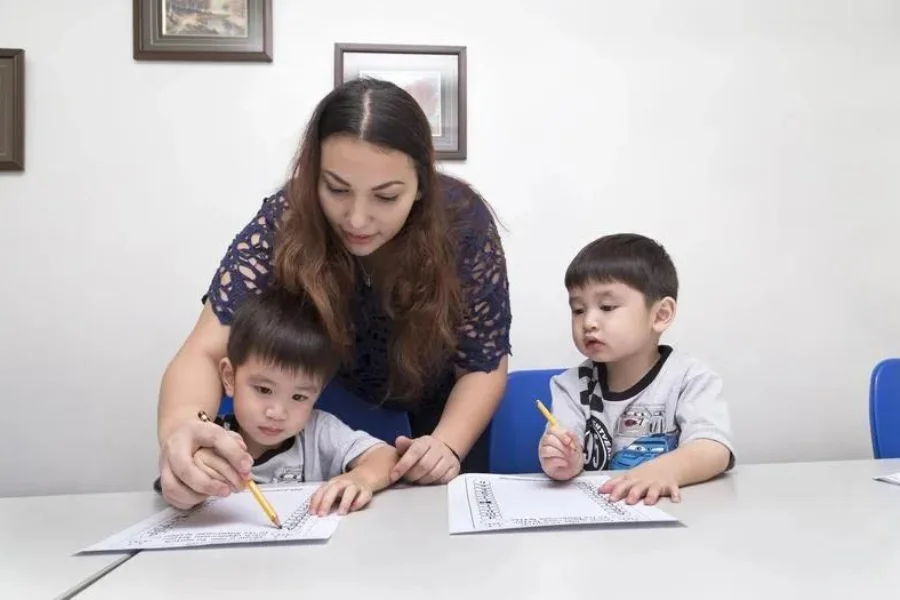
Source: alamy
A Shadow Teacher is a trained professional educator who works with a small batch of children in a regular classroom adhering to the child’s educational needs who might be facing learning disorders or other disabilities. They assist the Class teachers who might find it difficult to offer individualized attention to children with special needs. The Shadow teacher works dedicatedly with children ensuring they get the desired academic support that helps them function independently and ultimately be a part of the mainstream classroom.
A Teacher works closely with the class teacher, parents, and other occupational therapists to foster the child’s academic and overall progress. The Special teacher strives to enable the child’s smooth transition into a mainstream classroom for an effective learning experience.
Who Needs a Shadow Teacher?
As we embrace Inclusive Education as a significant aspect of the educational landscape, we must be ready to face the various challenges that come along with it. Inclusive education means children of different learning need to sit together in a regular classroom and acquire the same education but in a manner that suits their learning preferences. Considering this a Shadow teacher has a crucial role to play as they are responsible for students who might be facing any academic challenges due to their learning preferences. A Special Teacher is a trained professional who oversees limited students and provides them with the support they need to flourish academically and personally.
- Children who struggle with learning skills due to learning disorders such as dyscalculia, dyspraxia, and many more
- Students who possess autism spectrum disorder
- Children with developmental delays who require extra guidance in following classroom routines
- Children who cannot function independently as they have certain physical impairments.
- Children with emotional or behavioral challenges who need help managing their responses in a group setting
By offering personalized support, teachers ensure that these students can thrive in mainstream classrooms while still receiving the special attention they need.
What is the Fees of Shadow Teacher?
A Teacher is directly responsible for the academic success of a child which makes their job highly challenging. The Fees are subject to a lot of factors that include the skill level of the teacher, her level of experience, the Institute from where she has undergone her training, and many more.
The fees may also depend on the needs of the child and the time requirements in terms of hours. Families should inquire locally to understand the fees that meet their specific needs.

Source: freepik
How to become a Shadow Teacher?
To be a Special teacher the aspiring candidates need to possess certain academic prerequisites as they must cater to the needs of children with special needs.
To pursue this career, follow these steps:
Learn in-depth about the complexities of the Job Role
Budding Shadow Teachers should first be clear about what is expected from them as shadow teachers.
Academic Mandatory Qualifications
To become a teacher, one must have cleared their grade 12th from a recognized university.
Formal Training as a Shadow Teacher
Pursue a Shadow Teacher Training course from a recognized institution that is govt registered like Vidhyanidhi Education Society (Govt. Regd.) which is noted for its top-notch Teacher Training Course which offers practical training, and a comprehensive curriculum.
Polishing Skills
Being a special teacher demands a lot of patience and empathy from the teacher which is essential for providing the desired emotional support to children with special needs.
Gain Experience
Volunteer or intern in inclusive classrooms to build hands-on experience in working with SEN students.
Network and Apply
Attend special education seminars and connect with educators. Start applying for positions in schools or centers that focus on inclusive education.
By following these steps and leveraging the training from Vidhyanidhi Education Society (Govt. Regd,) you can build a rewarding career as a Shadow Teacher, making a meaningful impact on children’s lives.

Source: henryford
What are Career Prospects for Shadow Teacher?
As Special Education is now an irreplaceable aspect of any school’s setting the School management always prefers candidates who have the desired formal training in Special Needs Education for the smooth functioning of the regular classrooms. Special Teachers play a crucial role in supporting children with special needs, offering personalized assistance in mainstream classrooms. Therefore, the career prospects for special teachers are extremely bright, fulfilling yet challenging.
Professional Development
Shadow Teachers can enhance their expertise in areas like behavior management, psychological training, and special education techniques. With ongoing learning, they can stay updated with the latest practices and methods in education.
Career Advancement
As they gain experience, Special Teachers can progress to more senior roles. This includes positions such as lead special education teacher, SEN coordinator, or even administrative roles in inclusive education programs.
Collaboration Opportunities
Special Teachers work closely with teachers, counselors, and parents. This collaboration helps create and implement tailored strategies to support the child’s success, enriching their professional network and opening up future career paths.
One-on-One Support
By offering individualized support, Special Teachers help students participate fully in classroom activities, which can lead to roles in more specialized environments like inclusive daycare centers or special education programs.
Skill Development
They help children improve not just academically but also socially, enhancing the student’s overall development, which makes them essential in any educational setting.
This career provides fulfilling opportunities for those passionate about inclusive education and personal development.
What is duration of the Shadow Teacher Training Course?
When pursuing a diploma, the Shadow Teacher Training Course often takes one year to finish. To help children with special needs in inclusive classroom settings, this one-year credential gives prospective teachers the skills they need in behavior management, special education strategies, and child psychology.
The length of the program ensures that trainees are adequately prepared for their position as shadow instructors in regular or specialized educational settings by giving them enough time to cover both academic knowledge and practical experience.
Who is Eligible for Shadow Teacher?
Candidates who wish to work as Special teachers must be a of minimum 18 years of age. They should have completed their basic high school education which is 12th grade from a recognized college affiliated to a recognised university.
Some Education Institutions may prefer candidates who have some experience working with children with special needs with training in special education, remedial teaching, or experience working with children with diverse learning needs.
Possessing important qualities such as lucid communication patience, empathy, and strong communication skills are essential qualities for shadow teachers, as they support students who require individualized assistance to thrive in mainstream classrooms.

Source: henryford
What is Curriculum for the Shadow Teacher Training Course?
The curriculum for a Shadow Teacher Training Course equips individuals with the skills to support children with special needs in mainstream classrooms.
It covers key areas, including:
Understanding Developmental Disorders
This module focuses on the characteristics and types of developmental disorders such as autism, ADHD, and learning disabilities, helping Special teachers tailor their support.
Screening, Assessment, and Adaptations
Trainees learn methods for identifying students’ needs and how to adapt teaching strategies to accommodate those requirements.
Assistive Technology
This section explores various tools and devices that assist students in their learning process, enhancing communication, mobility, and access to educational materials.
Legal aspects and educational policies of Inclusive Education
This segment covers the legal implications of the different educational policies that have been floated for the benefit of children with special needs covering the various benefits and concessions that children with special needs are entitled to.
These components prepare special teachers to provide effective, individualized support in inclusive learning environments.
What is the Role of a Shadow Teacher?
The Role of a Shadow teacher is a highly influential one where her unwavering support helps the child to become independent for function effectively in a mainstream classroom.
Key responsibilities include:
- Helping the student stay focused and engaged in class activities.
- Encouraging appropriate participation and communication with teachers and peers.
- Notifying the classroom teacher if the student struggles to understand the material.
- Assisting the student in managing distractions and staying on task.
- Promoting a positive attitude toward new tasks and helping develop self-control.
- Improving communication by fostering eye contact and encouraging the student to seek help when needed.
- Guiding the student to share interests with peers and respond appropriately in social situations.
- Encouraging social interaction, such as initiating discussions, learning about classmates’ interests, and offering compliments when suitable.
These tasks ensure the student develops the skills needed to thrive academically and socially in an inclusive environment.
Is Shadow Teaching different from Special Education?
Shadow teaching and special education serve different roles in supporting students with special needs.
The key differences are:
One-on-One Support in Shadow Teaching
The goal of shadow teaching is to give each student in regular classrooms individualized, one-on-one support. In real-time, special teachers support students in overcoming learning obstacles and navigating daily classroom responsibilities.
More expansive Special Education Scope
Teachers in special education receive training in a variety of techniques that they can use both within and outside of the classroom. To meet a range of learning needs, this entails creating individualized education plans (IEPs), comprehending behavioral management, and utilizing assistive technology.
Classroom-Centric Approach
To help individual students follow classes, finish homework, and maintain engagement, special teachers are mostly trained in classroom-based techniques.
In contrast, special education teachers are equipped with skills for creating inclusive learning environments, which go beyond just classroom support.
Elevate your teaching skills with Vidhyanidhi Education Society’s STT Course today!
For more details on the STT Course Call/Whatsapp at +919321024137 / +919869866277
To download the brochure of the STT Course, Click Here!
STT Course
FAQs
Is there any Course for Shadow Teacher?
Yes, Vidhyanidhi Education Society offers a dedicated Shadow Teacher Training Course to equip individuals with the necessary skills and knowledge.
Can a Mother become a Shadow Teacher?
Absolutely! A mother with the required skills and passion for helping children can become a shadow teacher after completing relevant training.
What is Salary of a Shadow Teacher?
The salary of a shadow teacher varies based on experience, location, and the specific needs of the student being supported.



